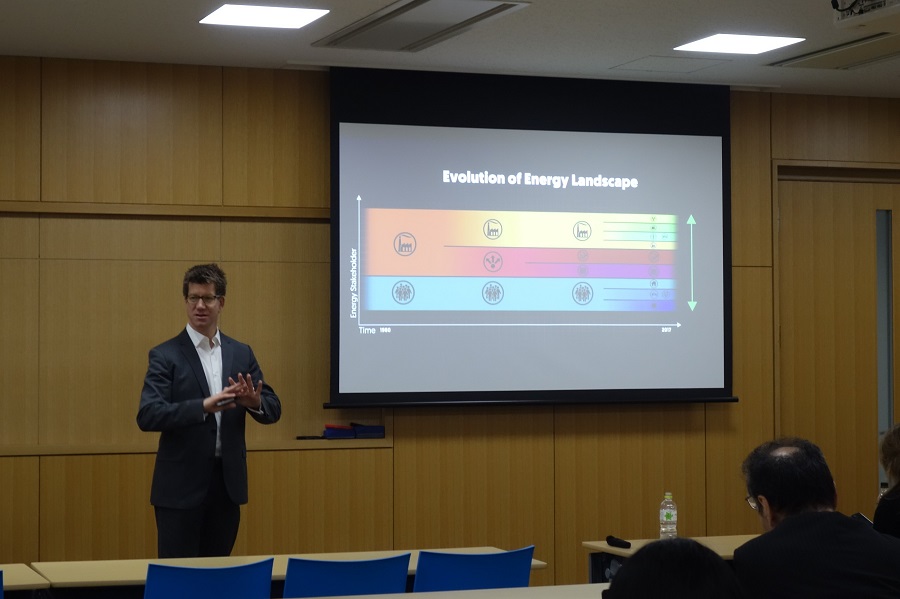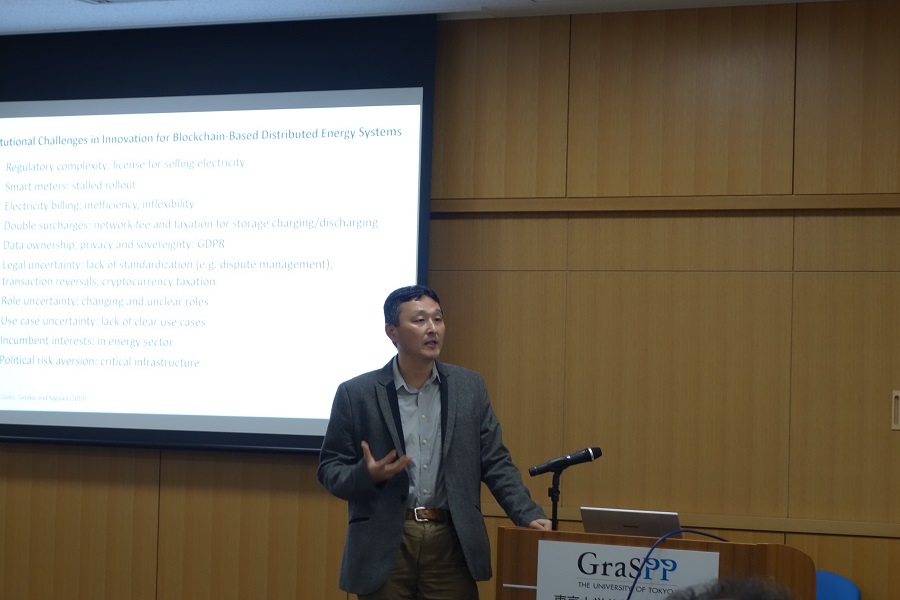ヴォルフガング・ケッター教授講演会「持続可能なエネルギーを恐れるな:人工知能の役割」
-
日程:2019年10月25日(金)
-
時間:16:30-18:00
-
会場:東京大学本郷キャンパス 国際学術総合研究棟4F SMBCアカデミアホール
地図 -
定員:
80名
-
言語:
英語(同時通訳はありません)
-
参加費:
無料(要事前申込)
-
主催:
東京大学未来ビジョン研究センター
ドイツ 科学・イノベーション フォーラム 東京(DWIH東京) -
共催:
東京大学科学技術イノベーション政策の科学教育・研究ユニット(STIG)
The words ‘sustainable energy’ usually provoke both hope for a cleaner future – and doubts. How can the whole world make a fast, fair and affordable transition away from fossil fuels? The doubts are there for good reason. Never has the world experienced such a sweeping change of such a fundamental aspect of living. Energy markets and electricity infrastructure were designed to provide flexibility in supply: energy was centralized, reliable and predictable. Sustainable energy technologies, many of which are getting cheaper by the year, supply electricity that is often decentralized, variable and more difficult to predict. The result? The more ‘sustainables’ we introduce into our markets and grids, the more we suffer unintended consequences like price and grid instability. The answer? Flexibility in demand – we need to create markets that support real-time dynamic pricing, virtual storage capacity and nimble, trackable localized trading in smart cities. In this speech, Professor Wolfgang Ketter will show examples of how AI and machine-learning agents can run these fast and nimble markets for us.
-
16:00会場受付
-
16:30-16:35オープニング
江間有沙(東京大学未来ビジョン研究センター特任講師)
-
16:35-17:20講演
Professor Wolfgang Ketter(Director of the Institute of Energy Economics and Chaired Professor of Information Systems, University of Cologne)
-
17:20-17:35指定討論者
鎗目雅(香港科学技術大学准教授)
-
17:30-17:50質疑応答
-
17:50-18:00クロージング
城山英明(東京大学公共政策大学院/未来ビジョン研究センター教授)
Professor Wolfgang Ketter is Director of the Institute of Energy Economics and Chaired Professor of Information Systems, University of Cologne as well as Director of the Erasmus Centre for Future Energy Business and Professor of Next Generation Information Systems, Rotterdam School of Management, Erasmus University. He leads a team of interdisciplinary researchers in discovering how we can rapidly exploit advances in computing power to create a faster, more sustainable transition to clean energy and mobility. Ketter is advancing a new paradigm that builds communities of researchers who learn from each other in fast-paced competitive environments that model important societal challenges, such as the future of energy markets. He is co-founder of one of the world’s largest AI-driven market simulation platforms, Power TAC.
As fellow and member of the WEF Global Future Council on Mobility and Energy Policy Advisor to the German government, his focus is on developing collaboration with business and policymakers to field-test digitalization of the energy landscape in projects such as the EU’s Ruggedized smart-city initiative and the Rotterdam Port Energy Cooperative.
Masaru YARIME is Associate Professor at the Division of Public Policy in the Hong Kong University of Science and Technology (HKUST). He also has appointments as Honorary Reader at the Department of Science, Technology, Engineering and Public Policy in University College London, Visiting Associate Professor at the Graduate School of Public Policy in the University of Tokyo, and Visiting Associate Professor at the School of Environment and Society in the Tokyo Institute of Technology. His research interests center around science, technology, and innovation policy for energy, environment, and sustainability. He has contributed to many international initiatives, including the United Nations Environment Programme Finance Initiative on Environmental Risk Integration in Sovereign Credit Analysis, Intergovernmental Panel on Climate Change Working Group III Fifth Assessment Report, and the Expert Group on Policy Support Tools and Methodologies of the Intergovernmental Science-Policy Platform on Biodiversity and Ecosystem Services. Currently he is serving on the editorial board of the international journals, Sustainability Science, Environmental Innovation and Societal Transitions, Frontiers in Energy Research – Energy Systems and Policy, and Frontiers in Sustainable Cities – Governance and Cities. He received B.Eng. and M.S. in Chemical Engineering from the University of Tokyo and the California Institute of Technology respectively and Ph.D. in Economics and Policy Studies of Innovation and Technological Change from Maastricht University in the Netherlands. His previous appointments include Senior Research Fellow at the National Institute of Science and Technology Policy. Personal Web Page: http://yarime.net/
2019年10月25日、ケルン大学のヴォルフガング・ケッター先生をお招きしてセミナーを開催しました。発表タイトルは「持続可能なエネルギーを恐れるな:人工知能の役割」であり、背景として再生可能エネルギーに対する懸念が、ドイツだけではなく世界各地で提起されていることを紹介しました。ケッター先生は、講演で持続可能なエネルギーを恐れる必要はないことを示しました。逆に持続可能なエネルギーへ移行するための素晴らしい技術として人工知能(AI)が使えるというのです。

気候変動の影響やエネルギー問題を含め、複雑すぎて課題の特定や解決策も定義しがたい「wicked problem(邪悪な問題)」があります。邪悪な問題は、考慮に入れなければならない変数や関係者が多いだけではなく、変化も早く生じます。このように複雑で難しい問題は、もはや人間だけでは解くことができません。最適解を探すためにAIが使われます。
ケッター先生はスマートシティにおけるエネルギー問題を事例として紹介しました。電力供給における再生可能で持続可能なエネルギーの割合は増加しています。石炭や石油などの従来のエネルギーを用いていた時、一般の人は消費者でしかありませんでした。しかし、太陽光などの再生可能エネルギーの割合が増えるにつれ、エネルギーの生産者になる人々が増えてきました。このような人々を消費者(コンシューマー)と生産者(プロデューサー)を合わせてプロシューマーといい、重要な役割を果たします。
電力供給を無駄なく配分するためには、エネルギー需要と供給のバランスを、様々なエネルギー源とコストを組み合わせしながら予測していく必要があります。変数が多様で複雑な問題に対しては柔軟な対応が必要ですが、太陽光発電などの再生可能エネルギーは天候や季節依存なところもあり、柔軟に対応できません。そのため、電力供給を100%再生可能エネルギーにはできません。複雑なパズルの最適解を計算するためにAIが使われます。
再生可能エネルギーを推進していくにあたっての技術的、社会的、経済的な課題はまだ多くあります。技術的にエネルギー貯蓄はまだ課題があります。さらには供給と需要を正確に予測するために個人の行動や選好を得る必要がありますが、それにはプライバシーの懸念もあります。しかしこれら課題の解決を通して新たなビジネスモデルやイノベーションも生じます。
ケッター先生は、Power Trading Agent Competition (Power TAC, www.powertac.org)というオープンソースのプラットフォームを運営しています。Power TACは、複雑な電力市場をモデル化し、機械学習を用いた自律的な取引エージェントを提供しています。家庭や小規模な企業での電力需要と供給のバランスを考えるモデルです。毎年、このモデルを改良するコンテストが開かれているほか、スタートアップを含め様々な人たちにモデルは使われています。ケッター先生は、ぜひ日本からもこのコンテストやプラットフォームに参加してほしいと呼びかけ、講演を締めくくりました。

指定討論者である香港科学技術大学の鎗目雅先生は、持続可能なエネルギーへの移行を促進する上での制度的課題について議論し、ケッター教授の研究と活動を促進するためには制度的枠組みを確立する必要があると論じました。例えば消費者が生産者にもなりうる場合は取引するためにライセンスが必要になるでしょう。
さらにはエネルギー取引をするにあたっては、安全・安心・プライバシーに関する社会的な懸念に適切に対応するための技術の標準化やデータの取り扱いについての整備が必要になります。最後に閉会のあいさつで東京大学の城山英明先生は、このような議論を推進していくためには、異分野、異業種の連携がますます重要になってくることを指摘しました。
東京大学未来ビジョン研究センターにはエネルギー関係とAI関係の研究ユニットがありますが、それぞれ現在、特に接点がありません。このようなテーマを通して新たな問題設定を立てて学内外で協同していくことが重要であると指摘して締めくくりました。
(文責:江間有沙)